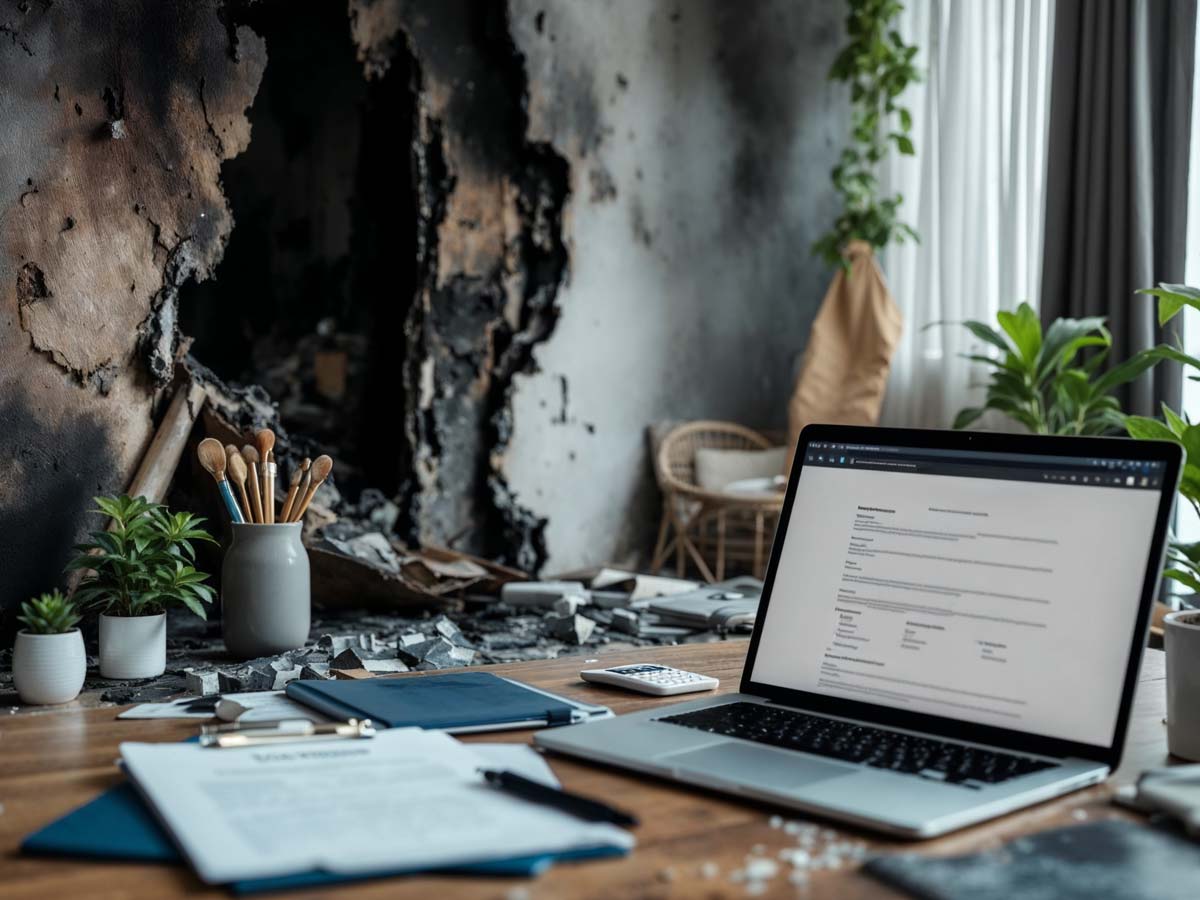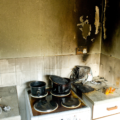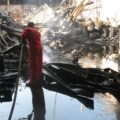
Fire damage poses a significant risk to property owners in Singapore, where the dense urban landscape and tropical climate can exacerbate the impact of such incidents. While fire safety measures are stringent in the city-state, the potential for devastating losses remains, making comprehensive insurance coverage a crucial safeguard for both residential and commercial property owners.
However, when disaster strikes, many property owners find themselves facing an unexpected challenge: navigating the complex and often overwhelming process of filing a fire damage insurance claim. The intricacies of policy terms, documentation requirements, and negotiation with insurance adjusters can turn an already stressful situation into a daunting ordeal.
This guide aims to shed light on the complexities of fire damage insurance claims in Singapore and provide property owners with expert tips to navigate this process effectively. By understanding the nuances of claim filing, documentation, and negotiation, property owners can better position themselves to receive fair compensation and expedite their recovery from fire-related losses.
Understanding Fire Damage Insurance Coverage
Types of Coverage
Building Insurance
What It Covers
Building insurance typically covers the physical structure of your property, including walls, roof, floors, and built-in fixtures like kitchen cabinets or bathroom fittings. This coverage is crucial for protecting the substantial investment you’ve made in your property.
Common Inclusions
Coverage usually includes damage caused by fire, lightning, explosions, and sometimes additional perils like flooding or vandalism. It may also cover the cost of demolishing and rebuilding the structure, debris removal, and architectural fees.
Who Needs It
Building insurance is essential for homeowners, landlords, and commercial property owners. For those with mortgages, lenders often require proof of building insurance as a condition of the loan.
Contents Insurance
What It Covers
Contents insurance covers the belongings within your property, including furniture, electronics, clothing, and personal items. This type of insurance is critical for protecting the valuables that make your house a home.
Common Inclusions
Policies typically cover items lost or damaged due to fire, smoke, and water damage resulting from firefighting efforts.
Who Needs It
Contents insurance is important for both homeowners and renters. Even if you don’t own the property, contents insurance can protect your personal belongings from fire-related losses.
Thoroughly Review Your Policy
- Understand Your Coverage Limits: Regularly reviewing and updating your coverage ensures that it keeps pace with any changes in the value of your property or belongings.
- Know Your Deductibles: The deductible is the amount you are responsible for paying out of pocket before your insurance coverage kicks in. In some cases, you may be able to adjust your deductible amount to balance your premium costs and out-of-pocket expenses.
- Clarifying Ambiguities: Insurance policies are often filled with legal jargon that can be difficult to understand. If there are any terms or conditions in your policy that you don’t fully grasp, seek clarification as understanding your policy thoroughly can prevent surprises when you need to file a claim.
Navigating the Claims Process
Filing a fire damage insurance claim can be a daunting task, especially when dealing with the aftermath of a fire. Understanding the claims process and knowing what steps to take can help you manage the situation more effectively and ensure that you receive the compensation you are entitled to.
Filing the Claim
- Initial Notification: As soon as the immediate danger has passed and everyone is safe, notify your insurance provider about the fire. Most policies require that you report the incident within a specific timeframe, so act quickly. Provide your insurer with all necessary information, including the date, time, and cause of the fire (if known), as well as an initial assessment of the damage.
- Documentation Requirements: Your insurer will require documentation to process your claim. Be as thorough as possible when documenting the damage to avoid disputes later in the process. For high-value items such as jewelry, electronics, or artwork, provide additional documentation such as receipts, appraisals, or certificates of authenticity to help substantiate your claim and prevent disputes over the value of these items.
- Claim Form Submission: You’ll need to fill out and submit a claim form which will require you to detail the extent of the damage, list the items that need to be repaired or replaced, and provide estimates of the costs involved. Be sure to keep a copy of the completed claim form and any correspondence with your insurer for your records.
Working with an Insurance Adjuster
- Role of the Adjuster: Once your claim is filed, you will be assigned an insurance adjuster to evaluate the loss, and estimate the cost of repairs or replacement. This report will be key to determining the amount of compensation you receive.
- Preparing for the Adjuster’s Visit: Before the adjuster arrives, gather all relevant documentation. Ensure that you can provide a detailed account of the events leading up to the fire. Accompany the adjuster during their inspection to ensure nothing is overlooked.
- Effective Communication: Be thorough in your discussions, ask for clarification if something isn’t clear. If you disagree with the adjuster’s assessment, request a re-evaluation or seek a second opinion.
Common Challenges and How to Overcome Them
- Claim Denial: This can happen for various reasons, including failure to meet policy conditions or lack of sufficient documentation. If your claim is denied, request a detailed explanation from your insurer and consider appealing. In some cases, hiring a public adjuster or seeking legal advice may be necessary.
- Underpayment: This can occur if the insurance adjuster underestimates the cost of repairs or replacements. To avoid underpayment, ensure you have accurate estimates from contractors or appraisers and provide this information to your insurer. Negotiate with your insurer if you believe the settlement offer is too low.
- Delays in Processing: Delays in the claims process can be stressful, especially if you need funds quickly to begin repairs or find temporary housing. To minimize delays, respond promptly to any requests for additional information from your insurer, and keep track of all correspondence. If the process takes longer than expected, follow up with your insurer for updates.
Expert Tips To Maximize Your Claim
Maximizing your fire damage insurance claim involves more than just filing the paperwork. To ensure you receive the full compensation you’re entitled to, it’s important to approach the process strategically.
Negotiating with Your Insurer
- Reviewing the Initial Offer: After your insurer reviews your claim, they will make a settlement offer. Carefully review this offer to ensure that it covers all of your losses. If the offer seems too low, negotiate.
- Understanding Your Rights: As a policyholder, you have the right to challenge your insurer’s assessment if you believe it is unfair. You can dispute the adjuster’s report, request a re-evaluation, or bring in experts to provide alternative estimates.
- Effective Negotiation Strategies: When negotiating, be clear, factual, and professional. Focus on the evidence that supports your claim, such as estimates, photos, and documentation. Be prepared to explain why you believe the initial offer is insufficient and what you believe would be a fair settlement. Remember that negotiation is a two-way process, and it may take time to reach an agreement.
Avoiding Common Mistakes
- Inadequate Documentation: One of the most common mistakes property owners make is failing to provide adequate documentation for their claim. Without proper evidence, your claim may be denied or underpaid. Take the time to thoroughly document everything and keep copies of all paperwork.
- Accepting the First Offer: Never accept the first settlement offer without reviewing it carefully. The initial offer may not fully cover your losses, and accepting it could leave you out of pocket. Always review the offer in detail and consider negotiating if necessary.
- Delaying the Claims Process: Delays in filing your claim or providing required documentation can result in reduced payouts or even claim denial. Staying organized and proactive will help keep the process on track.
By following these expert tips, you can maximize your fire damage insurance claim and ensure that you receive the compensation you need to recover from the loss.
The Role of Professional Assistance
While some property owners may feel confident handling their fire damage insurance claims on their own, there are situations where professional assistance can make a significant difference. Understanding when and how to seek professional help can enhance your chances of a successful claim.
When to Hire a Public Adjuster
- Benefits of Hiring a Public Adjuster: Public adjusters can be particularly helpful in complex cases where the damage is extensive, the claim is large, or there is a dispute with the insurer. They have the expertise to ensure that all aspects of the claim are properly documented and valued, which can lead to a higher payout. Additionally, public adjusters can handle the negotiation process, relieving the property owner of much of the stress and workload.
- When to Consider Hiring One: If you feel overwhelmed by the claims process, if your claim has been denied or underpaid, or if you believe the insurance company is not offering a fair settlement, it may be worth hiring a public adjuster. They typically charge a percentage of the settlement as their fee, so it’s important to weigh this cost against the potential benefits.
Legal Support
- When Legal Assistance is Needed: Legal support may be necessary if there is a dispute over the validity of your claim, if your claim has been wrongfully denied, or if you believe your insurer is acting in bad faith. An insurance lawyer can help you understand your rights and represent your interests in negotiations or court.
- Choosing the Right Lawyer: If you decide to seek legal assistance, it’s important to choose a lawyer with experience in insurance claims and a good track record of success.
Working with Restoration Experts
- Role of Restoration Experts: Restoration experts are professionals who specialize in repairing and restoring properties that have been damaged by fire, smoke, and water. They can provide accurate estimates for the cost of repairs, help prevent further damage, and assist with the cleanup and rebuilding process.
- Benefits of Early Involvement: They can provide immediate assistance with securing the property and preventing additional damage. Their detailed estimates and reports can support your insurance claim by providing clear documentation of the extent of the damage and the necessary repairs. Finally, they can work directly with your insurer to ensure that the repair process goes smoothly and that the costs are covered.
- Choosing the Right Restoration Company: When selecting a restoration company, look for one with experience and a good reputation for quality work. It’s also important to choose a company that is responsive, reliable, and able to work with your insurance company to coordinate the claims process.
Professional assistance can provide valuable support throughout the claims process, helping you navigate challenges, negotiate effectively, and ensure that your property is fully restored.
Preventative Measures to Minimize Future Fire Risks
Although dealing with the aftermath of a fire is critical, it’s equally important to minimize the risk of future fires. Implementing preventative measures can protect your property, reduce the likelihood of fire damage, and ensure that your insurance coverage remains adequate.
Fire Prevention Tips
- Smoke Detectors: Installing smoke detectors in key areas of your property is one of the most effective ways to prevent fire-related injuries and damage. Place detectors in every bedroom, outside sleeping areas, and on every level of the home. Regularly test the detectors and replace the batteries at least once a year.
- Electrical System Maintenance: Faulty wiring and overloaded circuits are common causes of house fires. Have a licensed electrician inspect your property’s electrical system regularly, especially if your home is older or you’ve recently added new appliances. Make sure all wiring is up to code and replace any outdated or damaged components.
- Safe Storage of Flammable Materials: Store flammable materials such as gasoline, propane, and chemicals in approved containers and keep them in a well-ventilated area away from heat sources. Avoid storing these materials inside the home, particularly in areas like basements or garages where they can pose a significant fire risk.
- Fire-Resistant Materials: Consider using fire-resistant materials when building or renovating your property. Such materials can help slow the spread of fire and provide additional protection. Fire-resistant landscaping, such as using non-flammable plants and materials around the exterior of your property, can also reduce the risk of fire spreading to your home.
Regular Policy Reviews
- Updating Your Coverage: As your property changes over time, so do your insurance needs. It’s important to review your fire damage insurance policy regularly to ensure that your coverage is adequate.
- Considering Inflation: The cost of building materials and labor can increase over time, which may affect the amount of coverage you need. Make sure that your policy’s coverage limits reflect current market conditions to avoid being underinsured in the event of a fire.
- Consulting with an Insurance Advisor: An insurance advisor can help you assess your current policy, recommend any necessary adjustments, and provide advice on additional coverage options.
Emergency Preparedness
- Creating an Emergency Plan: Having a well-thought-out emergency plan can save lives and reduce the impact of a fire. Your plan should include escape routes, designated meeting places, and procedures for contacting emergency services. Practice the plan regularly with your family or tenants to ensure that everyone knows what to do in case of a fire.
- Emergency Kits: Prepare emergency kits that include essentials such as water, food, first-aid supplies, flashlights, and important documents. Store these kits in easily accessible locations and ensure that they are updated regularly.
- Staying Informed: Stay informed about fire risks in your area by monitoring weather reports, local news, and government alerts. During dry spells or heat waves, take extra precautions to protect your property and be prepared to evacuate if necessary.
By implementing these preventative measures, property owners can reduce the risk of fire and ensure that they are better prepared to handle any future incidents.
Secure Your Singapore Property’s Future—Get the Right Guidance for Your Fire Damage Claim
In navigating the complexities of fire damage insurance claims in Singapore, property owners must arm themselves with knowledge and preparation. Understanding your policy, documenting your property, and knowing the claims process are crucial steps to safeguard your interests.
Professional guidance can be invaluable in this journey, offering expertise to ensure fair compensation and smooth claim resolution. Equally important are preventative measures – from regular maintenance to installing safety equipment – which can mitigate risks and potentially reduce premiums.
We encourage all property owners to take proactive steps: review your insurance policy regularly, stay informed about coverage options, and prepare for potential risks. Consider scheduling a comprehensive policy review with an insurance advisor to ensure your coverage aligns with your current needs and property value.
By staying informed and prepared, you can face potential challenges with confidence. For more expert tips on property management and insurance-related topics, we invite you to subscribe to our blog. Remember, when it comes to protecting your property, knowledge truly is power.
When fire damage strikes, navigating the complexities of an insurance claim can be overwhelming. At Big Red, we specialize in professional fire damage restoration and insurance claim support, ensuring you get the compensation you deserve while restoring your property efficiently. Our experienced team is here to guide you through every step of the process, from damage assessment to claim negotiation. Contact us today at +65 6241 9443 or reach us via WhatsApp at +65 9321 9321 to discuss your fire damage restoration needs. Let Big Red help you secure your property’s future with a smooth claims process and expert restoration services you can trust.




